[ad_1]
These ridiculously good homemade cinnamon rolls bake up to be big, soft, and extra fluffy. Thanks to a little help from a food processor, they are simple to make and have the most luxurious buttery texture. Don’t let cinnamon rolls or the length of our recipe intimidate you, these rolls can be made in a few hours or turned into overnight cinnamon rolls. Jump to the Soft Cinnamon Rolls Recipe
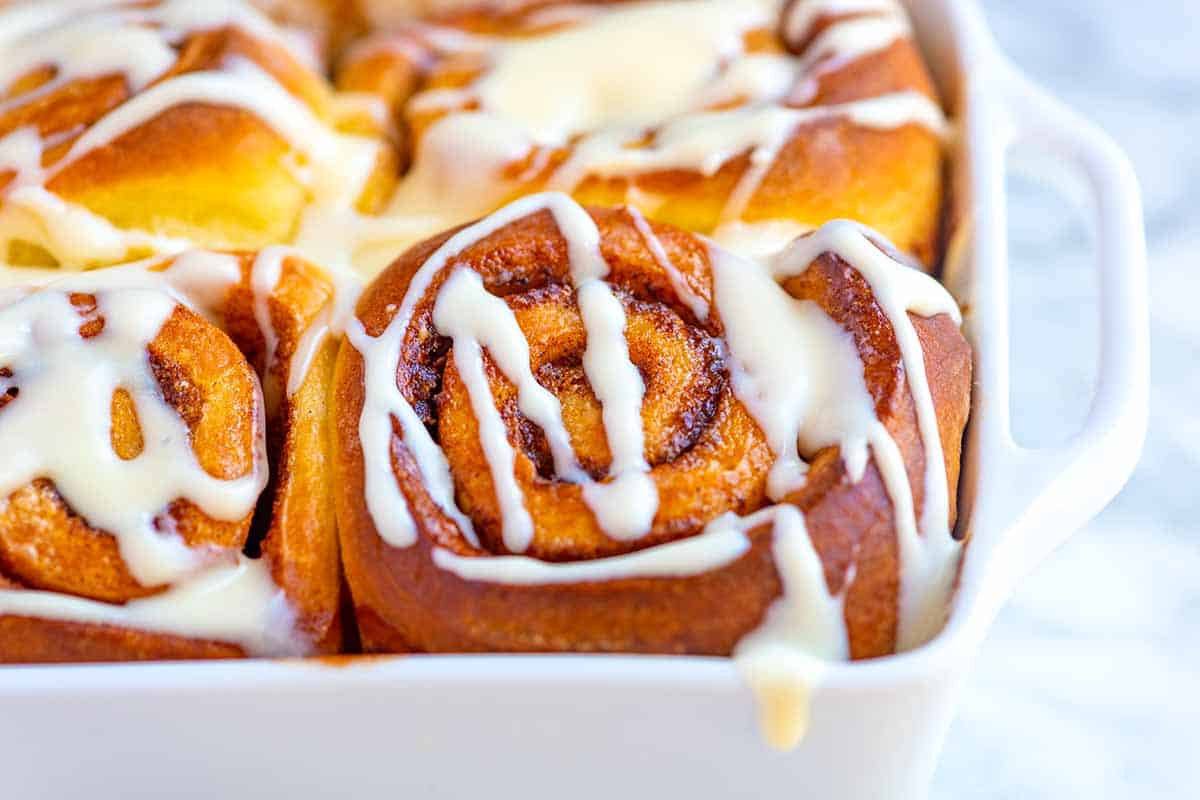
How to Make Cinnamon Rolls From Scratch
When I first thought about making homemade cinnamon rolls, I was a little apprehensive. Then, once we stumbled across this simple method, I was hooked. Now I look back at my worries and shake my head. These rolls are easy to make and I know anyone can do it!
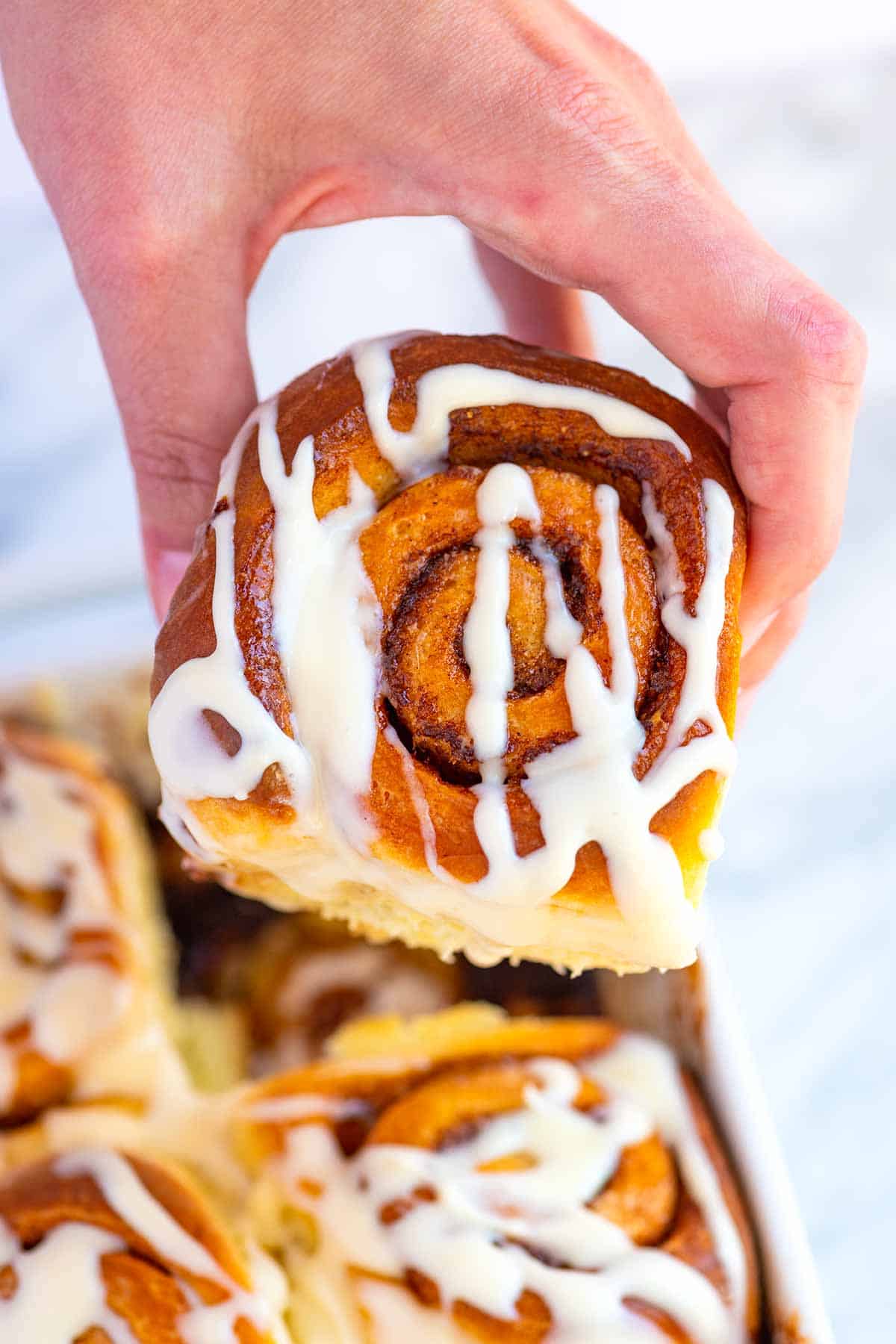
What You Will Need
The ingredients needed for these easy cinnamon rolls aren’t complicated and you likely have some of them already sitting in your kitchen. Let me quickly walk you through them, remember, the full ingredient list with amounts is in the recipe below.
Flour — We use all-purpose flour, but bread flour works in this recipe. (Some recipes actually recommend bread flour since it should make the rolls even more tender inside.)
Milk — Warm milk is the start of our dough and helps to make the rolls soft inside.
Yeast — We use active dry yeast to make these rolls.
Sugar — Granulated, brown sugar, and powdered sugar are used in our recipe. Granulated sugar is added to the dough as well as to the brown sugar used for the cinnamon sugar filling. Powdered sugar is what makes our glaze.
Butter — We use quite a bit of butter for these rolls and its why these rolls taste so darn good.
Spices — You can’t have cinnamon rolls without cinnamon, but we also add a little cardamom and nutmeg to our cinnamon sugar filling. They make the rolls taste incredible.
Cream cheese and cream — For the glaze on top, you have a few options. I love a simple cream cheese glaze, but we have also shared how to make a simple vanilla glaze in the recipe below.
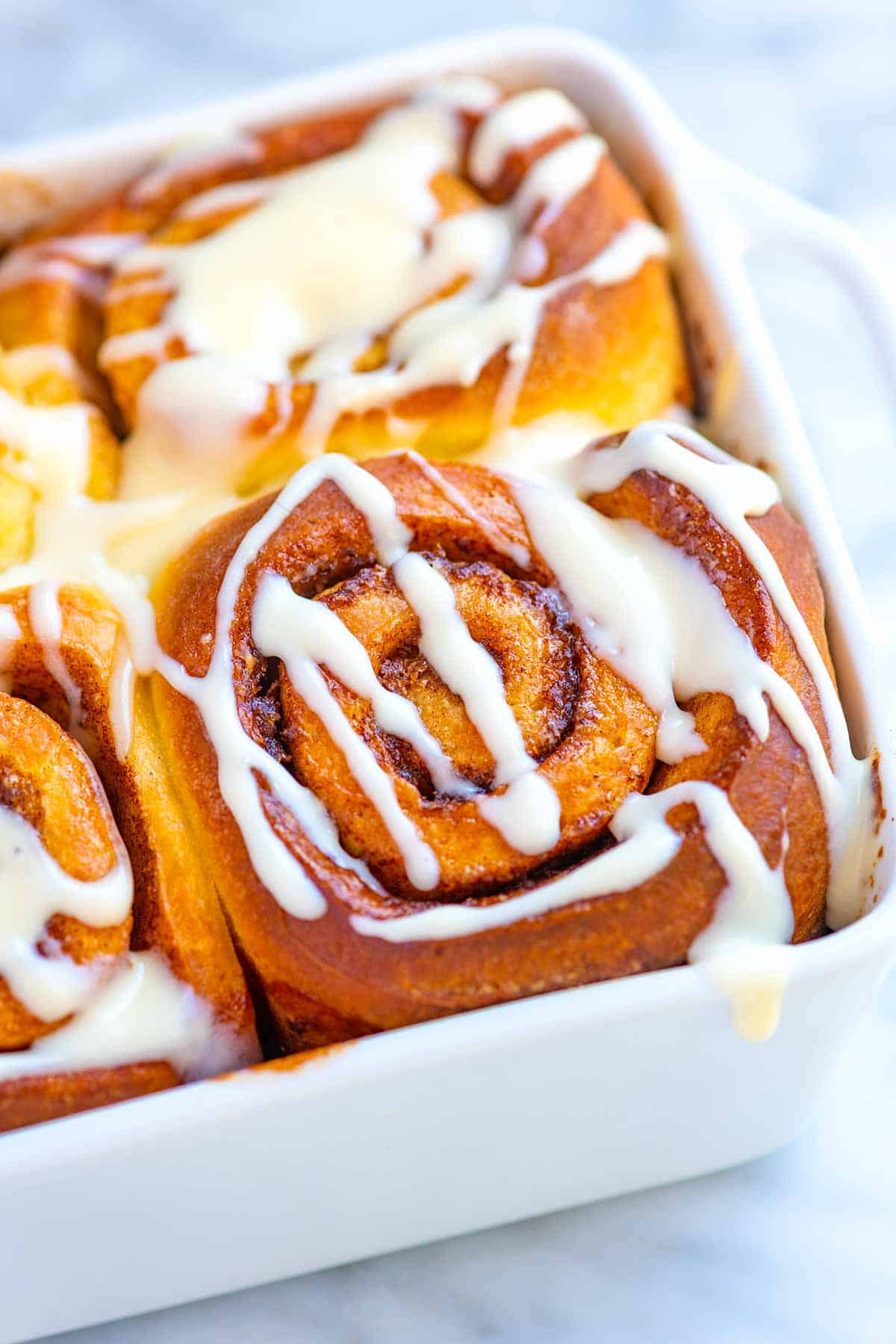
Making the Rolls
The secret to these easier cinnamon rolls is a food processor. It makes quick work of the dough. The idea for using a food processor was inspired by James Beard who shared how to use a food processor to make brioche dough. Brioche is a buttery, heavenly dough that bakes up to be soft and rich in the middle.
Beard’s shortcut allows us to make a brioche-like dough with much less effort and time than usual. It’s also the perfect dough for making cinnamon rolls.
Here are the basic steps for making cinnamon rolls. I know yeast breads can be a little intimidating at first, but don’t worry. This method is simple and fun!
Make the dough: Cut butter into flour using a food processor — this is how we start when making our no-fail pie dough. Then add a mixture of yeast, milk, and sugar as well as beaten eggs. Process until a dough forms. The dough will be a little sticky so don’t be alarmed.
Quickly knead the dough: There’s no need to knead this dough for a long period of time. All we need to do is work the dough until it comes together into a ball. Watch our video to see us do it. It only takes a few minutes, promise.
Allow dough to rise: You have two options, here. First, you can allow the dough to rise at room temperature, which will take 60 to 90 minutes. Second, you can place the dough into the refrigerator and allow it to slowly rise overnight. If you choose the overnight option, you will need to let the dough come back close to room temperature before rolling it.
Make cinnamon sugar filling: This might be my favorite part (I always sneak a little taste of the filling). I like to soften my butter in the microwave until almost melted then I stir in both brown sugar and granulated sugar, lots of cinnamon, cardamom, and nutmeg. Using both sugars adds a lovely texture, but you can use 100% brown sugar if you prefer.
Shape the rolls: Roll out the dough, spread the (delicious) cinnamon filling on top and roll up. Slice the rolls, and then place into a buttered dish. Set the rolls aside to rise another 30 minutes before baking.
Bake the rolls and glaze: The rolls need 20 to 30 minutes in the oven to bake. Cool them for a little bit so that they aren’t piping hot and then drizzle a glaze on top.
Making Smaller or More Cinnamon Rolls
As you can see from our video and photos, we love to make big, tall cinnamon rolls. That doesn’t mean that there isn’t flexibility when it comes to how many rolls you decide to make. It’s all about the size of your baking dish.
Depending on how many rolls you plan to make, you will also need to adjust the size of the rolled out dough and the thickness of each slice. Here’s a guide to help you determine how many rolls you should cut to fit your pan ?
Make 6 big rolls:
- Use a small rectangular baking dish that’s about 6-inches by 9-inches, a 5-inch by 9-inch loaf pan or an 8-inch round cake pan (the rolls rise and bake to fit the pan).
- Roll the dough out to a square that’s approximately 12 by 12-inches and cut into 6 equal rolls, about 2-inches wide.
Make 8 to 9 slightly smaller rolls:
- Use an 8-inch or 9-inch round cake pan or use a 8-inch or 9-inch square baking dish. You can also use a 9-inch pie plate.
- Roll the dough out to a square that’s approximately 13 by 13-inches and cut into 9 equal rolls, about 1 1/2 inches wide.
Make 12 smaller rolls:
- Double the recipe and use a 9 by 13-inch baking dish or quarter sheet pan (9-inches by 13-inches).
- Roll the dough out to a rectangle that’s approximately 18 by 12-inches and cut into 12 equal rolls, about 1 1/2 inches wide.
Remember that, in general, the rolls with rise and bake to fit whatever pan you use so if there is some space between each roll before baking, they should spread in the oven. Also, depending on how large your rolls are, the bake time might be slightly different. Use our recipe as a guide, but keep an eye on the rolls as they bake.
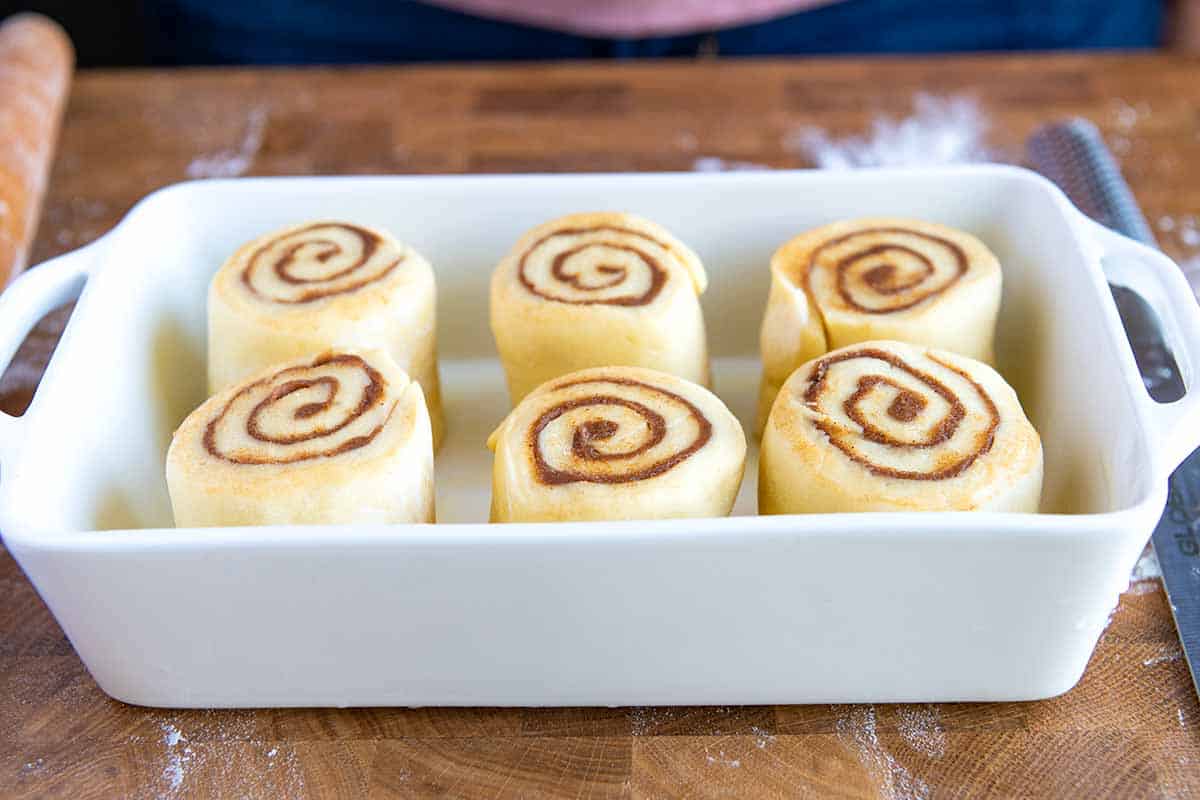
Overnight Cinnamon Rolls
This recipe enables you to make cinnamon rolls within a few hours or you can make overnight cinnamon rolls. There are two options shared below ?
OPTION #1: Proof the dough overnight. When making the rolls overnight, do two things the night before:
- Make the dough, place it into a resealable plastic bag and allow it to slowly rise in the refrigerator overnight.
- Make the filling. You can keep this on the counter overnight or refrigerate. If you do refrigerate the filling, it will need to come to room temperature the next morning so that it is spreadable.
The next morning, we roll, slice, and bake the rolls. You can make the glaze while they bake.
OPTION #2: Wake up to fully assembled rolls! When making the rolls overnight, do these three things the night before:
- Follow the recipe below including proofing the dough at room temperature.
- Fill and roll the dough and cut into rolls.
- Place the rolls into a baking dish, and then tightly cover with some plastic wrap or wax paper that’s been brushed with a little melted butter. Refrigerate the rolls overnight. Tightly wrapping the rolls is very important since uncovered dough will dry out overnight.
The next day, remove the rolls from the refrigerator and allow them to come to room temperature before baking.
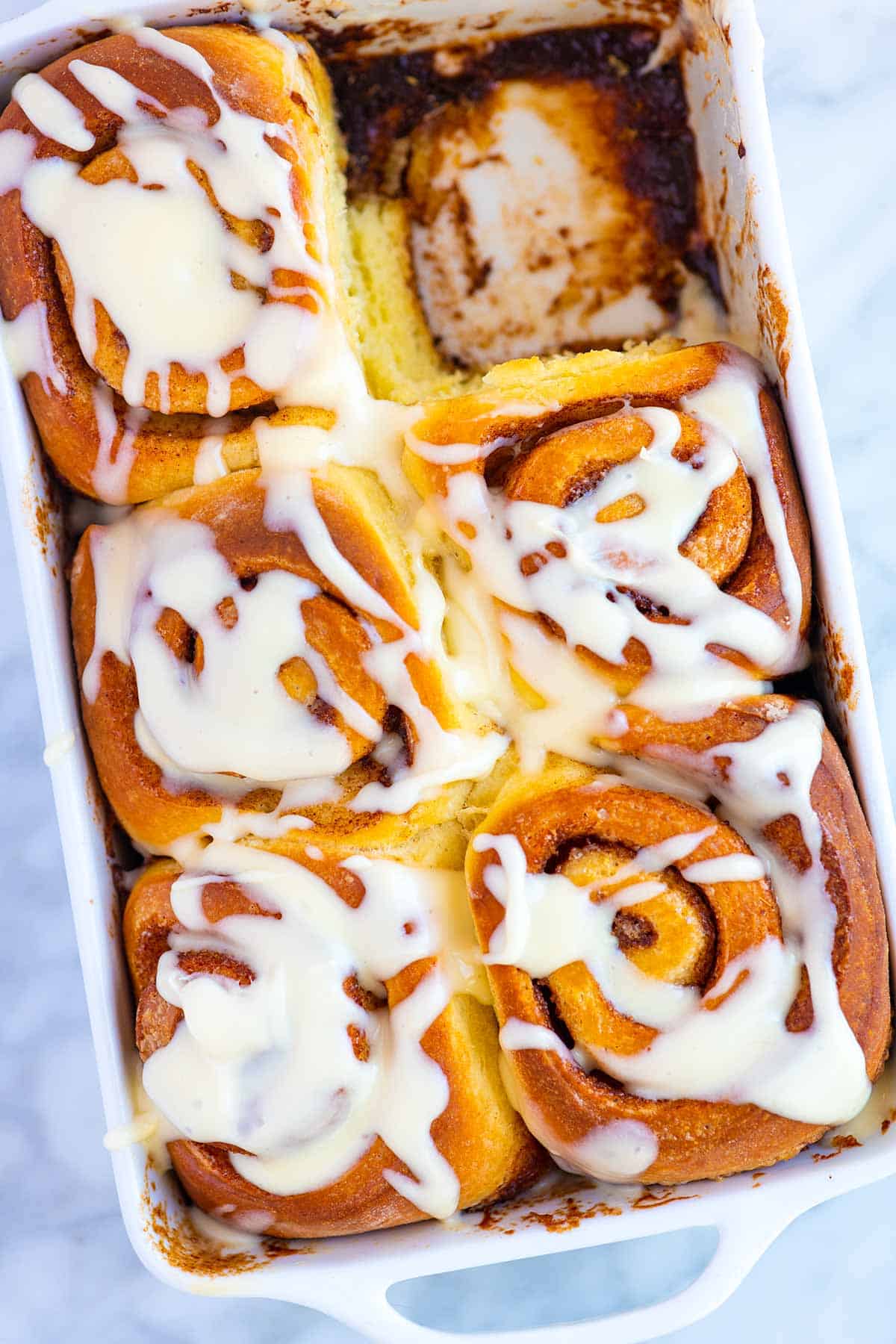
Adam and Joanne’s Tips For Success
There’s no need to be intimidated when making your own batch of homemade cinnamon rolls. In our testing, we learned a few tricks to help the process go smoothly:
- Check the yeast. If after a few minutes of sitting with the warm milk, your yeast is not bubbling, it’s no good. Watch our video to see what our yeast looked like.
- Don’t worry if the dough is a bit sticky. We add a lot of butter and egg to this cinnamon roll dough, which pretty much guarantees that the dough will be on the stickier side. When working with the dough, keep your work surface and rolling pin floured and use a light touch. If the dough seems unworkable or too soft, chilling it for a few minutes in the freezer or refrigerator should remedy it.
- Chill the dough before slicing into rolls. We’ve found that chilling the rolled up dough before slicing into rolls makes getting a perfect slice much easier. A sharp knife is also useful (some recipes recommend unflavored floss).
- Add a little heavy cream before baking. We noticed this tip popping up in quite a few of the recipes we researched and so we tried it. The cinnamon rolls are amazing without any additional cream, but if you spoon a tablespoon or so of cream over each roll just before baking, it makes the tops shiny and the middles and bottom extra gooey.
More Simplified Baking Recipes
Ridiculously Good Cinnamon Rolls
- PREP
The method for making these cinnamon rolls is based on a popular trick for making brioche dough in a food processor, shared by talented chefs including James Beard, Julia Child and Jack Pepin. The food processor takes the prep time down considerably.
A note on sizing: There is flexibility when it comes to how many rolls you decide to make. It’s all about the size of your baking dish. Take a look at our article above for our guide on make 6 large, 9 medium, and 12 smaller cinnamon rolls.
Makes 6 Large Rolls
Watch Us Make the Recipe
You Will Need
Dough
1/4 cup (60 ml) whole milk
3 tablespoons plus 1 teaspoon (38 grams) granulated sugar, divided
2 1/4 teaspoons active dry yeast (one 1/4-ounce packet)
2 cups plus 2 tablespoons (268 grams) all-purpose flour or bread flour
1/2 teaspoon fine sea salt
1/2 teaspoon ground cinnamon
6 tablespoons (85 grams) cold unsalted butter, plus more for the pan
2 large eggs, beaten
1/4 cup (60 ml) heavy cream for pouring over rolls before baking, optional
Cinnamon Filling
6 tablespoons (85 grams) unsalted butter
1/4 cup packed (50 grams) brown sugar, preferably dark brown sugar
2 tablespoons (25 grams) granulated sugar
1 tablespoon ground cinnamon
1/2 teaspoon ground cardamom, optional
Pinch freshly grated nutmeg, optional
Cream Cheese Glaze
2 tablespoons cream cheese, softened
2 tablespoons heavy cream
4 tablespoons powdered sugar
1/4 teaspoon vanilla extract
Pinch fine sea salt
Directions
- Make Dough
- Proofing the Dough
- Prepare the Filling
- Assemble The Rolls
Warm milk until it is between 110 and 115 degrees Fahrenheit. If you do not have a thermometer, to check the milk temperature, you should be able to dip your finger into the warmed milk and hold it there. It should feel slightly warm, not hot.
Add the warm milk, 1 teaspoon of granulated sugar, and yeast to a small bowl then whisk a few times to combine. Set aside for 10 to 15 minutes. After this time, the mixture should look like a bubbly mass (see our video). If it does not look this way, the yeast you have used may be expired.
Meanwhile, add flour, 3 tablespoons of granulated sugar, salt, and the 1/2 teaspoon of cinnamon to the bowl of a food processor. Pulse two to three times until blended.
Cut the butter into 6 evenly sized pieces, and then scatter them on top of the flour mixture. Pulse until the butter is cut into the flour. The mixture will look like very fine crumbs.
Add the yeast mixture and pulse two more times, then add the eggs and process until most of the dough gathers into a rough ball that goes up the sides of the bowl. The dough will be sticky.
Transfer the rough dough to a well floured work surface. You will likely need a spatula to scrape the dough stuck to the bottom and sides of the food processor bowl. Knead the dough one to two minutes or until smooth, adding flour as needed.
For rolls made on the same day, form the dough into a ball, and then place into a large, lightly oiled bowl. Cover with a clean dish towel and set aside in a warm place to rise until doubled in size, 60 to 90 minutes.
Alternatively, for overnight cinnamon rolls, place the dough into a lightly oiled and tightly sealed plastic bag. Refrigerate overnight. The dough will slowly proof in the refrigerator overnight. In the morning, allow the refrigerated dough to sit at room temperature for 5 to 10 minutes before rolling out.
Warm the butter (in the microwave or on the stove) until almost melted. Stir in the sugars, cinnamon, cardamom, and nutmeg. Set aside at room temperature until needed. The butter will firm up slightly.
Butter a small rectangular baking dish or an 8-inch round cake pan. If your dish is larger or you plan to make a higher number of smaller rolls, see our tips in the article above. In the video and photos, we used a 9-inch by 6-inch ceramic dish.
Turn the risen dough out onto a lightly floured work surface and roll it into a 12-inch by 12-inch square. It is okay if it goes a little longer on one side.
Brush the dough of excess flour, and then spread the cinnamon sugar mixture all over, making sure to take the mixture all the way to the edges.
Starting at the edge closest to you, roll the dough into a tight spiral. If the ends look a little jagged, clean them up by slicing 1/2-inch from both ends of the roll. Slice the roll into 6 equal pieces, about 2 inches each. If the dough is too soft to cut, carefully transfer the roll to a sheet of parchment paper and place onto a baking sheet. Chill in the refrigerator for 20 minutes or freeze for 5 minutes, and then cut into rolls.
Arrange the rolls inside the buttered pan. Cover with a clean dish towel and let rise in a warm place for about 30 minutes. After 15 to 20 minutes, preheat the oven to 350 degrees Fahrenheit.
Adam and Joanne’s Tips
- Storing: These, like most cinnamon rolls, are best enjoyed the day they are baked. Store leftover rolls up to 2 days at room temperature or wrap them well and store in the freezer up to 1 month. To reheat, warm in a 350F oven until heated through.
- Simple Vanilla Glaze: Whisk about 1/4 cup of heavy cream, 1/2 teaspoon vanilla extract, and 2 to 2 1/2 cups powdered sugar until blended.
- Nutrition Facts: The nutrition facts provided below are estimates. We have used the USDA database to calculate approximate values.
If you make this recipe, snap a photo and hashtag it #inspiredtaste — We love to see your creations on Instagram and Facebook! Find us: @inspiredtaste
Nutrition Per Serving: Serving Size 1 large cinnamon roll (1 of 6) / Calories 554 / Total Fat 28.5g / Saturated Fat 17g / Cholesterol 133.1mg / Sodium 240.6mg / Carbohydrate 67.7g / Dietary Fiber 2.5g / Total Sugars 31.5g / Protein 8.3g
[ad_2]
Source link
